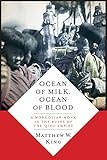Ocean of Milk, Ocean of Blood : A Mongolian Monk in the Ruins of the Qing Empire / Matthew W. King.
Material type: TextPublisher: New York, NY : Columbia University Press, [2019]Copyright date: ©2019Description: 1 online resourceContent type:
TextPublisher: New York, NY : Columbia University Press, [2019]Copyright date: ©2019Description: 1 online resourceContent type: - 9780231191067
- 9780231549226
- 294.3/923092 23
- BQ942.L5825
- online - DeGruyter
- Issued also in print.
| Item type | Current library | Call number | URL | Status | Notes | Barcode | |
|---|---|---|---|---|---|---|---|
 eBook
eBook
|
Biblioteca "Angelicum" Pont. Univ. S.Tommaso d'Aquino Nuvola online | online - DeGruyter (Browse shelf(Opens below)) | Online access | Not for loan (Accesso limitato) | Accesso per gli utenti autorizzati / Access for authorized users | (dgr)9780231549226 |
Frontmatter -- Contents -- Acknowledgments -- Conventions -- Introduction -- Part I: Enchantment -- ONE. Wandering -- TWO. Felt -- THREE. Milk -- Part II: Disenchantment -- FOUR. Wandering in a Post-Qing World -- FIVE. Vacant Thrones -- SIX. Blood -- Conclusion -- Notes -- Bibliography -- Index
restricted access online access with authorization star
http://purl.org/coar/access_right/c_16ec
After the fall of the Qing empire, amid nationalist and socialist upheaval, Buddhist monks in the Mongolian frontiers of the Soviet Union and Republican China faced a chaotic and increasingly uncertain world. In this book, Matthew W. King tells the story of one Mongolian monk's efforts to defend Buddhist monasticism in revolutionary times, revealing an unexplored landscape of countermodern Buddhisms beyond old imperial formations and the newly invented national subject.Ocean of Milk, Ocean of Blood takes up the perspective of the polymath Zawa Damdin (1867-1937): a historian, mystic, logician, and pilgrim whose life and works straddled the Qing and its socialist aftermath, between the monastery and the party scientific academy. Drawing on contacts with figures as diverse as the Dalai Lama, mystic monks in China, European scholars inventing the field of Buddhist studies, and a member of the Bakhtin Circle, Zava Damdin labored for thirty years to protect Buddhist tradition against what he called the "bloody tides" of science, social mobility, and socialist party antagonism. Through a rich reading of his works, King reveals that modernity in Asia was not always shaped by epochal contact with Europe and that new models of Buddhist life, neither imperial nor national, unfolded in the post-Qing ruins. The first book to explore countermodern Buddhist monastic thought and practice along the Inner Asian frontiers during these tumultuous years, Ocean of Milk, Ocean of Blood illuminates previously unknown religious and intellectual legacies of the Qing and offers an unparalleled view of Buddhist life in the revolutionary period.
Issued also in print.
Mode of access: Internet via World Wide Web.
In English.
Description based on online resource; title from PDF title page (publisher's Web site, viewed 02. Mrz 2022)


